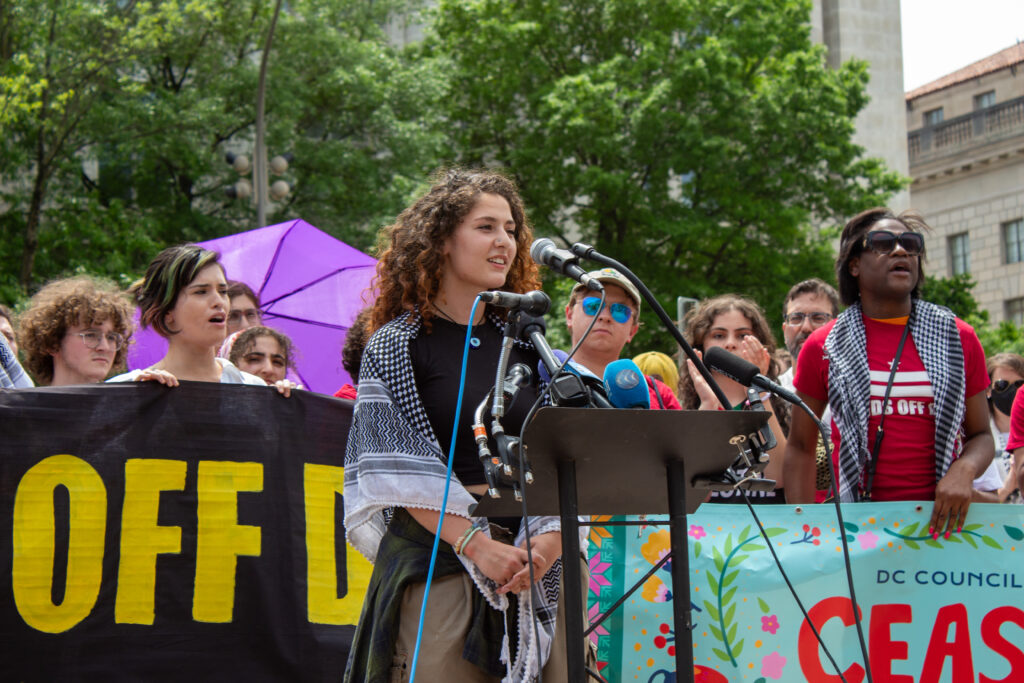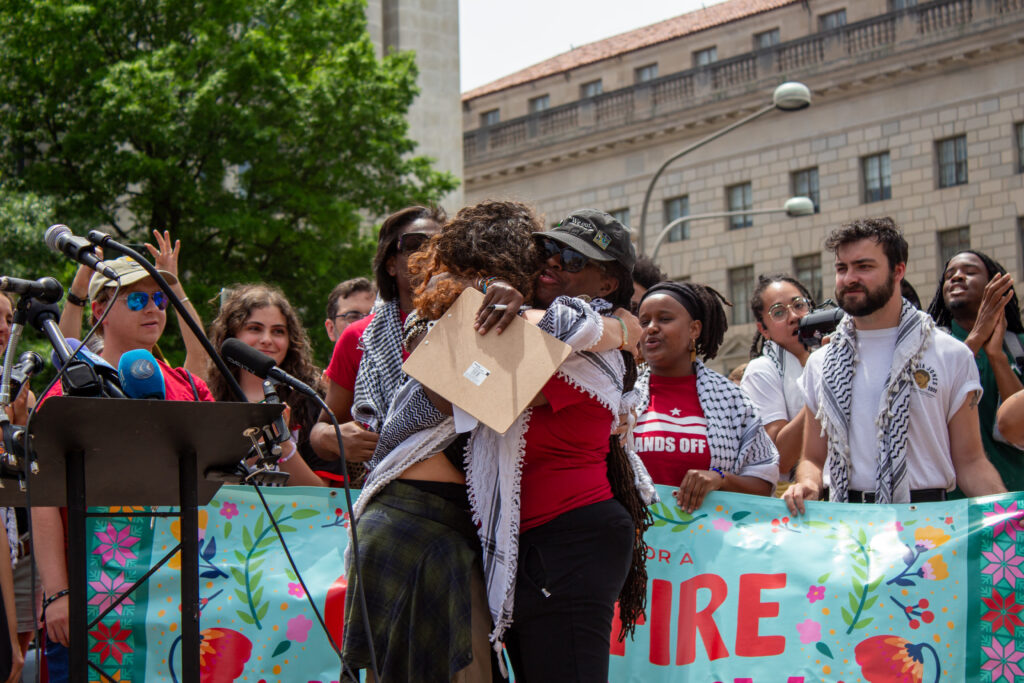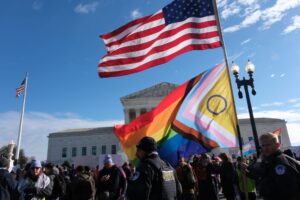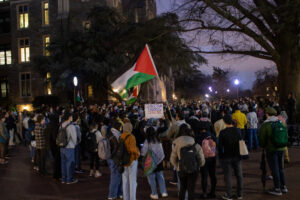In two consecutive press conferences on Wednesday afternoon, encampment organizers, leaders of other community advocacy organizations, and members of Congress responded to the Metro Police Department (MPD) clearing of the Gaza solidarity encampment at George Washington University (GW) early this morning.
Thirty-three arrests were made Wednesday morning as MPD cleared the Gaza solidarity encampment, an MPD spokesperson told the Voice. Among those arrested are students from GW and Georgetown. MPD also deployed pepper spray against demonstrators.
The encampment has drawn attention from members of Congress, and D.C. Mayor Muriel Bowser and MPD chief Pamela Smith were originally scheduled to testify about their earlier refusal to clear the encampment before the House Committee on Oversight and Accountability this afternoon. However, Rep. James Comer (R-Ky.), chairman of the committee, canceled the hearing in light of the police sweep.
Press conference with members of Congress, arrested students, 2:45 p.m.
Students arrested at the encampment spoke alongside Reps. Cori Bush (D-Mo.) and Rashida Tlaib (D-Mi.) at a press conference outside the U.S. Capitol Building. Community members, many who were also at a 1 p.m. press conference, gathered nearby to show support.
Before the press conference began, interactions between Capitol Police and those gathered outside the Capitol grew tense, as police refused to allow community members and members of the media into the area barricaded for the press conference. Several organizers for Harriet’s Wildest Dreams (HWD), an abolitionist organization that organized an earlier press conference on Wednesday, were denied entry until Rep. Bush walked over and asked Capitol police to allow community members into the area.
Police presence increased as Rep. Bush spoke with officers, causing Rep. Tlaib to ask other officers if they could stand back and not bring their police dogs into the area. Tlaib explained to the police that several of the students present had just had traumatic experiences with police hours before. The Capitol Police officers stood down after several requests from Bush and Tlaib.
Once the press conference began, Bush spoke first.
“This is all happening because those who refuse to stop the ongoing genocide in Gaza think they can arrest and brutalize their way out of this situation. They think they can intimidate and erase the overwhelming voices for peace and justice,” Bush said. “They think they can jail dissenters and silence the wide consensus among people in this country that there should be an immediate and permanent ceasefire.”
She connected the Gaza solidarity encampments across the country to other police action against protest and civil disobedience throughout American history, including the suffrage movement, the civil rights movement, and student activism against the Vietnam War.
“Protest isn’t meant to be comfortable. It is meant to be disruptive. And if you don’t want folks to protest, then prioritize humanity over profit, humanity over your donors,” Bush said.
Tlaib, the only Palestinian member of Congress, spoke in defense of the students and denounced fellow members of Congress who called for police raids.
“It is outrageous that police are now entering college campuses across our nation, their guns drawn, targeting students with pepper spray, tear gas, rubber bullets, and tasers,” Tlaib said. “It is incredibly disturbing though, you all, that my colleagues are so quick to denounce the student protesters. But our silence about these young people about why they are protesting.”
 Photo by Margaret Hartigan
Photo by Margaret Hartigan
Students also spoke at the press conference, reflecting on both the MPD sweep and the last 13 days of the encampment.
Kali, an organizer and student from GW, said that GW administration has refused to negotiate with student organizers about their demands.
“Instead of inching towards an agreement on any terms, members of the administration at GW have publicly lied about engaging with us while working to violently clear our encampment,” Kali said. “Since day one, we have understood the monster before us. It is a collusion of academic institutions, administration, police, Congress, and the state at large to protect the interests of the Israeli occupation of Palestinian land.”
In a statement on May 5, GW president Ellen Granberg wrote that GW representatives have “conducted regular and sustained dialogues” with encampment organizers, but that these efforts failed. Organizers have continually maintained that Granberg formally declined all requests to negotiate.
Moataz Salim, a graduate student at GW and an encampment organizer, said that the police raid was far from GW administration’s only option.
“We wholly reject the notion that a police raid was the only possible outcome to our protests, especially given the violence. Surely it was the most convenient outcome for a university that wishes to silence pro-Palestinian voices, but certainly not by any stretch of the imagination, was necessary,” he said.
Kali said that over the last 13 days, the encampment had become a supportive, inclusive space for students and demonstrators, as the community shared food and resources.
“The idea that somehow the site of cultural exchange and community education was more deserving of a congressional and state repression than the ruthless and internationally-condemned, genocidal military campaign is reprehensible,” Kali said.
Miriam Siegel (CAS ’26), who was arrested in the police sweep, was the last of the students to speak. In her statement, she highlighted the acceptance she felt as a Jewish student in the Gaza solidarity encampment and condemned its clearing by police early this morning.
“My morale was kept up by the hundreds of students and community members who showed up to show solidarity for Gaza,” Siegel said. “As a Jew, I have been taught about my people’s long history fighting oppression. I’ve learned that it is my responsibility as a Jew to fight oppression.”
Siegel said she felt a greater sense of connection to her Jewish faith while living in the encampment. She said that a rabbi arranged a bat mitzvah for her, which she had not celebrated before because the Zionist synagogues in her hometown conflicted with her anti-Zionist views.
“I feel safer as a Jew inside of the encampment than I do anywhere else. And that is because I know that all of my comrades, all of my community, values collective liberation for all people, for Palestinians, for Jews, for everyone,” Siegel said.
 Photo by Margaret Hartigan
Photo by Margaret Hartigan
Salim—who had a bandaged hand that he said was injured during the clearing this morning—said that this morning’s police sweep has only further energized organizers’ efforts.
“The university and the police repression toward our community has only fueled the flames of our righteous anger and the radical hope for a future of sincere justice and liberation,” Salim said. “And we will not stop fighting until we get it, you best believe that.”
Hands Off, D.C. press conference, 1 p.m.
 Photo by Margaret Hartigan
Photo by Margaret Hartigan
HWD and encampment organizers held a press conference for the media and a crowd of around 80 at Freedom Plaza. Speakers included representatives from the Free D.C. Movement, HWD, GW Alumni for Palestine, and the D.C. ceasefire coalition, as well as a student who was arrested at GW this morning.
Nee Nee Taylor, executive director of HWD, spoke first, addressing the canceled House Committee on Oversight and Accountability hearing and objecting to congressional and mayoral intervention against the GW encampment.
“Comer is a Republican bully, and Muriel Bowser is too,” Taylor said, in reference to Rep. James Comer (R-Ky.), chairman of the Committee on Oversight and Accountability, and D.C. Mayor Bowser.
Nora, a student who was arrested at the encampment, spoke as well, beginning her speech by singing a song that she said demonstrators were singing in jail.
“I came back to the jailhouse and I took back my dignity,” she sang. “And I took back my humanity. Now they’re under my feet, under my feet, under my feet. Ain’t gonna let the system walk all over me.”
Despite the arrests and use of force by MPD, Nora said that organizers remain encouraged and determined.
“We are here, we are strong,” she said. “They can mace us, they can brutalize us. They can pepper spray us. But the movement is here. It is stronger than ever. Our energy has not dissipated. As a matter of fact, it’s come back.”
Organizers of the press conference tied the police sweep of the encampment early this morning to what they described as a history of American colonialism and police brutality.
“What we witnessed happen to students this morning is not a new phenomenon, but rather a legacy of this country’s demented past,” Frankie Seabron, a lead organizer with HWD, said.
Multiple speakers criticized congressional involvement in the encampment, connecting the comments made by representatives about the encampment and canceled congressional hearing to the issue of D.C. statehood.
“It’s unjust, paternalistic, and frankly just wasteful to subject local D.C. affairs to scrutiny by those who are not elected by the residents of Washington,” Kelsye Adams, co-lead of the Hands Off D.C. Coalition, said. “It’s time for Congress to listen to our voice and grant the people of D.C. statehood.”
Nora stressed that although the students are coping with arrests and police violence, their focus remains on Israel’s ongoing invasion and bombardments in Gaza.
“No matter how brutalized we are, matter how much cop presence we have, it is nothing compared to what is happening in Palestine,” she said. “It is nothing compared to what’s happening in Gaza. It is nothing compared to what is happening right now. And we will not lose sight of our compass.”
 Photo by Margaret Hartigan
Photo by Margaret Hartigan






